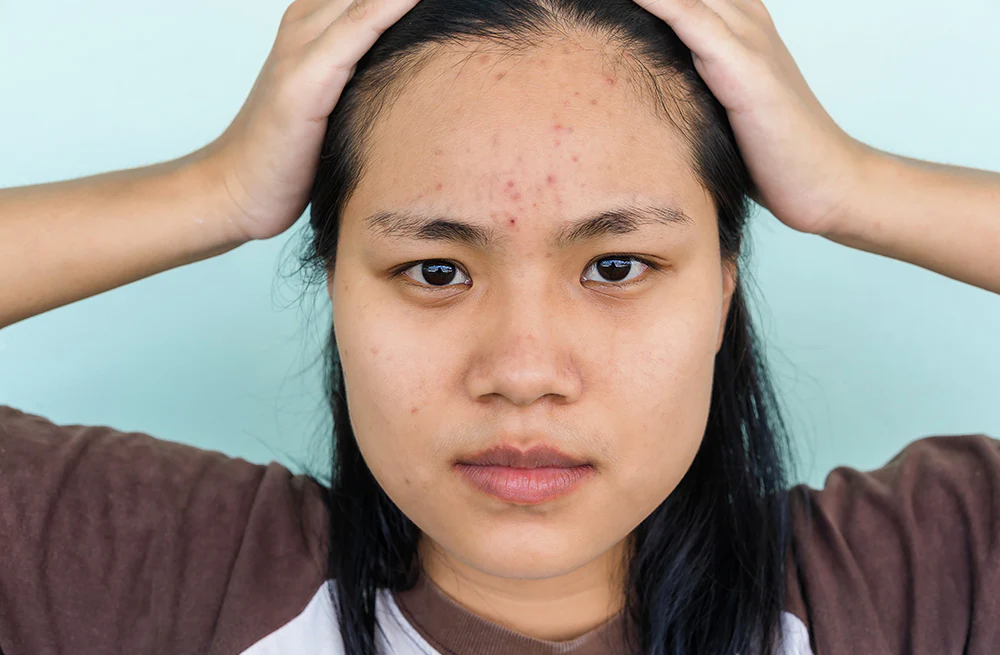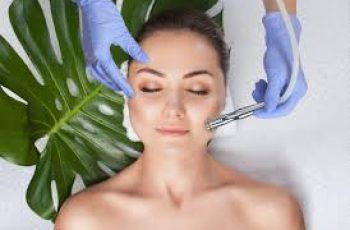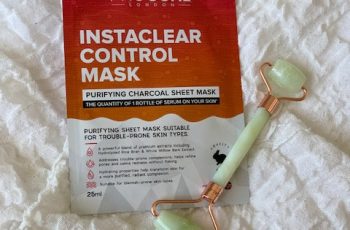Ask Your Dermatologist: 4 Lies You’ve Been Told About Acne
If you suffer from acne, you’ve probably scoured the internet for the latest tips and tricks for clear skin. Sometimes the advice is useless, like rubbing toothpaste on blemishes or squirting salt water on your face. With so many different acne products on the market, it can be hard to tell which are legal and which are illegal.
With the help of Dr. Anthony Nuara, MD, FAAD, we’ll dispel some of the myths about acne treatments and causes, and tell you which products really help reduce and prevent acne breakouts.
What Causes Acne?
Acne is multifactorial, meaning it’s not caused by a single factor. What we know for sure is that acne spots form when pores become clogged with sebum (oil) and dead skin cells. This can appear as a blackhead or whitehead. Raised pimples form when the oil or dead skin cells become inflamed or infected by bacteria like Proteobacterium acnes.
But for those who regularly struggle with acne, what causes the excess oil, congestion, and inflammation? Here’s what science says:
Genetics: In a 20211 systematic review and meta-analysis, researchers found 60 genes associated with acne susceptibility. So if acne runs in your family, you may be troubled by it, too.
Hormones: Acne is often associated with teenagers for a reason: hormones. Hormonal fluctuations during adolescence can lead to increased sebum production and acne lesions, but fluctuations can also occur in adulthood. Women may suffer from acne at different times during their menstrual cycle or menopause. Men may struggle with acne if they have high testosterone levels or are taking hormone therapy.
Medications: Acne can also be a side effect of various medications, such as corticosteroids, lithium, vitamin B12, thyroid hormones, and antibiotics. 2
Lifestyle: This is a touchy subject. While stress, a poor diet, and lack of sleep don’t necessarily cause acne, they can trigger it in genetically susceptible people.
Now that you have a basic understanding of what causes acne, it’s time to correct some misconceptions. Here, four of the biggest acne myths debunked.
Azelaic Acid 14% Cream
Azelaic Acid 14% Cream
• Reduces acne and rosacea
• Brightens skin tone and reduces brown spots
• Unclogs pores and improves skin texture
Regular Price $45
Add to Cart
Myth 1: Drinking water gets rid of acne
Water is undoubtedly good for you and your skin, but it has no real therapeutic properties other than helping you wash your face. While research suggests that consuming enough water can have a positive impact on the skin by increasing elasticity (which can slow signs of aging), there is not enough evidence to determine how this affects acne marks. 3
Myth 2: Only teenagers get acne
I wish this was true. Adults often get acne, especially middle-aged women and those approaching menopause due to the dramatic hormone fluctuations during this time. Adult men and women who are taking hormone replacement therapy or have higher testosterone levels may also experience acne.
Myth 3: Eating junk food is the cause of acne
There is some truth to this. Studies have shown that a diet high in carbohydrates4 and refined sugars can exacerbate acne. 5These types of foods can increase serum triglycerides and increase sebum production, which can lead to clogged pores. Whey protein is known to make acne worse in young people. 6
Myth 4: Acne means you should clean your face more often
While hygiene is important for keeping your skin healthy, there is a limit to what you can scrub off. In fact, washing too often or scrubbing too hard can irritate your skin and even worsen acne. A gentle cleanser is a better choice, but if you choose a cleanser with alpha and beta hydroxy acids to open up your pores, use it with caution as they can irritate your skin.
Best products for acne
Niacinamide and azelaic acid are two powerful ingredients to add to your daily skincare routine. These two multi-tasking ingredients are gentle enough to be used together and can help eliminate breakouts and prevent them altogether. Here’s how they compare:
Foundation Skincare’s 10% Niacinamide Lotion: Based on moisturizing hyaluronic acid, this product helps inhibit sebum production, control and prevent acne while soothing the inflammation and irritation that comes with breakouts. Niacinamide also boosts the skin’s immunity to infection, fades acne scars, and aids in DNA repair.
Foundation Skincare’s 14% Azelaic Acid Cream: This must-have day cream contains a potent medical concentration of azelaic acid, a beneficial yeast with antibacterial, antioxidant, and anti-inflammatory properties. It removes acne-causing bacteria from the skin, reduces inflammation, and fades pigmentation caused by acne scars. Azelaic acid is also good for hormonal acne because it blocks the increased sebum production caused by elevated testosterone levels.
Women who experience hormonal imbalances or suffer from acne that causes scarring should consult a licensed dermatologist for further advice and an appropriate treatment plan.
Finding an acne treatment can be overwhelming, but it doesn’t have to be. The next time someone tells you a weird new trick, be sure to ask for evidence to back up their claims. There are countless myths and misconceptions about what causes acne and how to treat it, but once you start using the right products, the path to clear skin and the skin itself will become clear.
DQH Knowledge drop: In your 20s, your skin cell turnover decreases. (Cell turnover is a key component in keeping your skin youthful.) You know what else slows down? Your collagen production. Starting in your 20s, collagen decreases by about 1 percent per year. Should you want to prevent fine lines and wrinkles, start by eliminating behaviors that contribute to premature aging. “If it’s bad for you, it’s bad for your skin,” says dermatologist Michel Somenek.
“Cigarette smoking reduces blood flow to the skin and causes premature wrinkling and a dull skin texture. Making the repeated pursed motion to inhale can also cause smoker’s lines. Alcohol and recreational drugs are toxins for the skin that damage its cellular structure and DNA,” Somenek tells us. “The faster you eliminate vices while you are young, the better chance your skin and body have to recuperate.” Also, adopting an anti-aging routine in your 20s is key. After all, the best offense is a good defense. We spoke to Somenek and experts Joshua Ross and Audrey Kunin to find out more.
Keep reading for the best anti-aging products for your 20s, according to skincare professionals.
Sunscreen
“We all know that the sun is the number one cause of skin aging and starting the prevention in your 20s is very important,” Ross says. “The majority of your sun damage won’t start to appear until you’re in your 30s, so don’t wait until you see it surface or you’ll be behind the curve. Stay ahead of it with a good-quality zinc-based sunscreen worn daily.”
Farmacy Green Defense Daily Mineral Sunscreen
An invisible sunscreen with SPF 30, plus botanical extracts meant to protect skin with tons of antioxidants. Bonus: It’s clean and fine to use under makeup.
Bareminerals Complexion Rescue™ Tinted Moisturizer Broad Spectrum SPF 30
Although we recommend you use your SPF and moisturizer separately, we also understand moments when you don’t have time or energy for that extra step. For those times, this bareMinerals moisturizer is a great thing to have on hand.
Vitamin C Serum
“A great introduction to anti-aging is to start with a vitamin C serum in your morning skincare routine,” Ross says. “It’s a powerful antioxidant that will neutralize free radicals and brighten the skin.” He adds that it’s a great way to counteract the effects of the sun’s harmful rays, which, as previously mentioned, are among the biggest causes of premature aging.
Drunk Elephant C-Firma™ Vitamin C Day Serum
The Drunk Elephant C-Firma is a lightweight serum that promises to give skin a glow by combining the brightening powers of vitamin C with ferulic acid, l-ascorbic acid, and vitamin E. The included sodium hyaluronate is meant to replace hydration loss, so you shouldn’t have to deal with any irritation.
Sunday Riley C.E.O. Rapid Flash Brightening Serum
This potent serum is jam-packed with vitamin C (15 percent, to be exact), which means it’s a potential superstar at both brightening skin and dousing it in antioxidants.
Peptides
Using peptides on your skin has many benefits, says Somenek. “The skin barrier is what defends the body against pollution, UV rays, bacteria, and toxins. It can be damaged by several everyday factors. Using topical peptides aids in building a stronger barrier,” he says. “Peptides comprise elastic fibers, which are a type of protein. These fibers help to make skin appear taut and firm. Peptides can also help repair damaged skin, relieve inflammation, and even out skin tone. Some peptides can kill acne-causing bacteria that is common in 20-somethings.”
Kunin agrees, saying, “Peptides are an excellent entry point for supporting collagen.” She recommends looking for face and eye treatments that contain these collagen-boosting powerhouses.
Charlotte Tilbury Magic Eye Rescue Cream
This Charlotte Tilbury super-emollient eye cream has a base of coconut oil and shea butter (read: it’s incredibly hydrating). Botanicals plus peptides are meant to help reduce dark circles and boost collagen, respectively.
This creamy moisturizer serves up potent collagen-boosting peptides and pycnogenol, and antioxidant-rich vitamin C. “Instead of sitting on top of the skin, peptides penetrate the outer layer so they go deep. The ‘signals’ they send tell the cells to produce elastin and collagen, which are needed for youthful-looking skin,” explains Somenek.
At-Home Peel Pads
Remember that skin cell turnover fiasco we talked about earlier? One way to help support it is by exfoliating. “Exfoliation is important to help keep skin fresh and luminous,” Kunin says. She recommends using at-home peel pads as an easy and effective way to exfoliate.
“The goal in your 20s is to fight the slowing pace of cell turnover. It is wise to use products that gently exfoliate, yet still remove oil and other impurities. Products that have Alpha Hydroxy Acids (AHA) or Beta Hydroxy Acids (BHA) are a good choice.”
According to Somenek, you should only exfoliate two to three times a week. “People of all ages are guilty of over-exfoliating and that can be too much of a good thing,” he says.
Dermadoctor Kakadu C Intensive Vitamin C Peel Pad
A few swipes of this Derma Doctor powerful peel pad promise to leave your skin glowing and smooth, thanks to the seven (yes, seven) types of chemical exfoliants, including AHA and BHA. It also contains vitamin C via Kakadu plum extract for added brightening and antioxidant protection.
KEY INGREDIENTS Kakadu plum extract is sourced from the Kakadu plum, a fruit grown in northern Australia. It contains vitamin C, which restores the skin’s natural barrier, increases collagen production, and soothes irritation.
Dr. Dennis Gross Skincare Alpha Beta® Universal Daily Peel Pads
These are the gold standard of peel pads, with a cult following and over 900 five-star reviews on Sephora. They’re easy to use and contain a blend of anti-aging exfoliating acids.
Emollient Night Cream
“In your 20s, you need to start upping the hydration in your skincare routine. You may have been cautious of over-moisturizing because of acne in your teens, but as you enter your 20s, your skin transitions and becomes drier,” Ross says. “I recommend an emollient night cream added into your evening skincare regimen.”
“Twenty-somethings need to make sure that they are not using creams that will clog their pores and cause excess oil production,” says Somenek. Opt for non-comedogenic products.
Cerave Skin Renewing Night Cream
One great choice is the CeraVe Skin Renewing Night Cream, which is a non-comedogenic night cream that leaves skin soft and glowy. It combines the moisturizing powers of ceramides and hyaluronic acid.
RoC Retinol Correxion Max Hydration Creme
“The best night cream ingredients contain retinol, benzoyl peroxide, and/or salicylic acid or hyaluronic acid. The goal is to moisturize, yet remove excess oil,” says Somenek. This Roc Retinol Correxion cream fits the bill as it contains both hyaluronic acid and retinol so it promises to moisturize while also being non-comedogenic.



